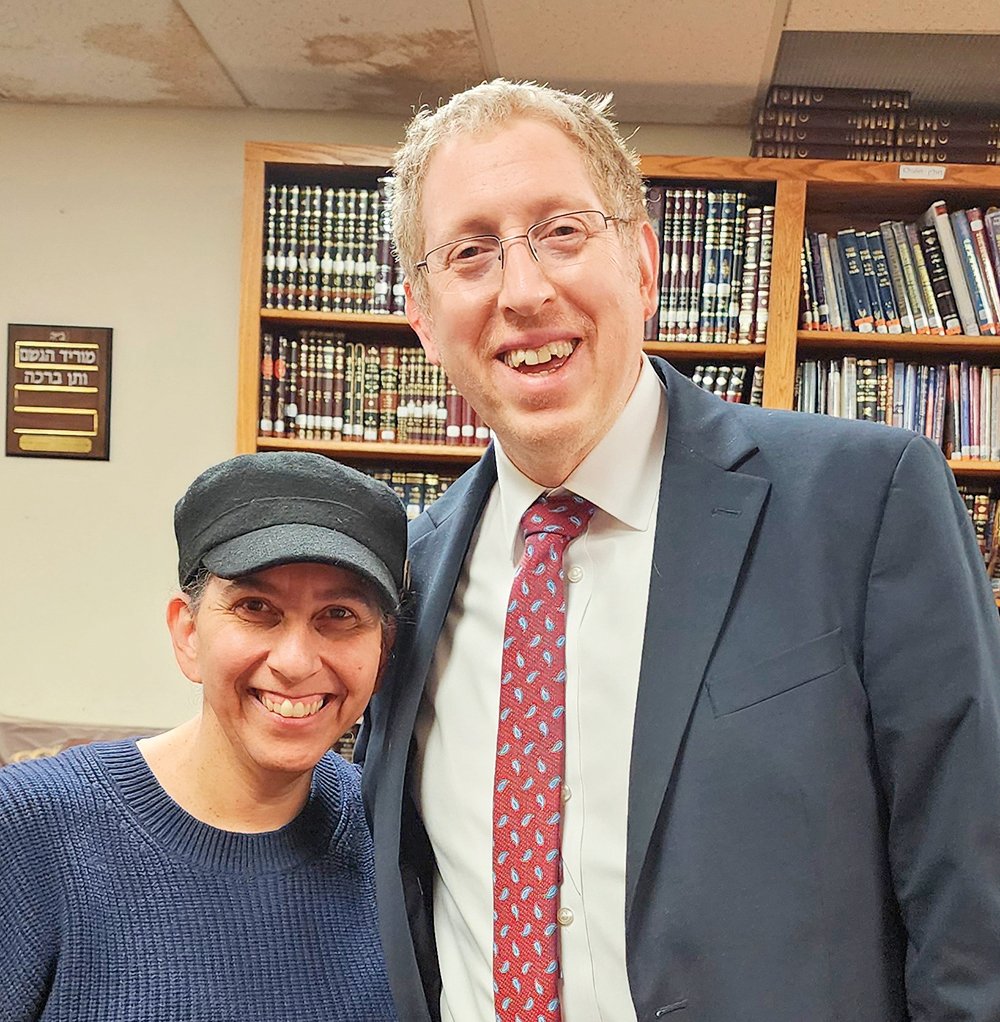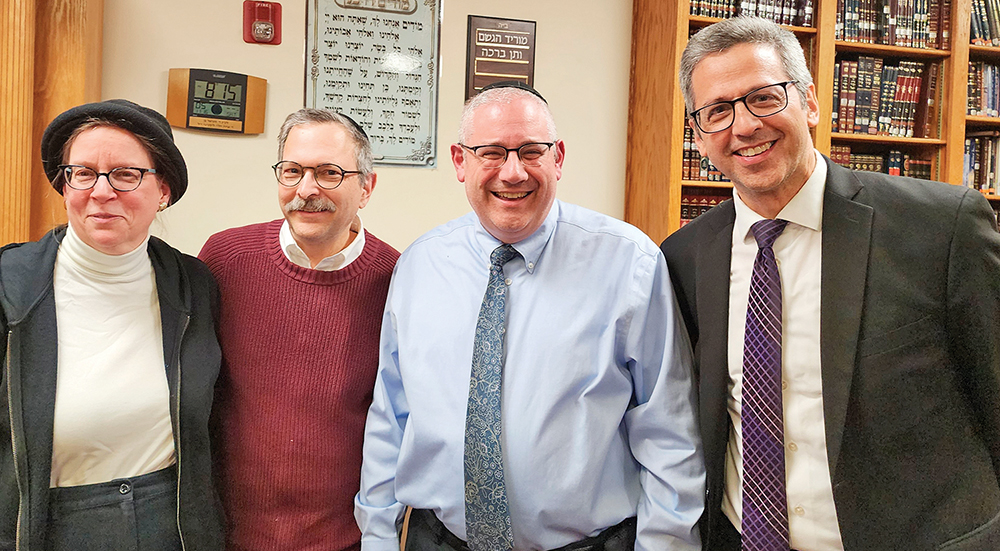
Congregation Ohr Torah in Edison hosted an intriguing presentation by Rabbi Dr. Edward Reichman on reproductive issues from a Torah perspective. Over 50 people attended “The Travails of Chanina and Ruchami on ‘Shtisel,’ Balancing the Life of the Fetus vs. The Mother” in person and via Zoom on Motzei Shabbat, November 16.
Reichman was in the area for Shabbat, speaking about emerging medical topics, technological advances and Torah concerns at Highland Park’s Congregation Ahavas Achim for a special Medical Ethics Shabbat, sponsored by Barry and Marcia Levinson. The Jewish Community Forum of Raritan Valley (formerly known as the Orthodox Forum of Edison/Highland Park) eagerly added a presentation for the general community.
Following a welcome by Josh Caplan, co-chair of the Forum, and an introduction by Barry Levinson, Reichman began with an overview of the story in the fictional Netflix series “Shtisel” where a young Orthodox couple faces issues of abortion, surrogacy and birth control and the medical and rabbinical advice they receive. Does the show accurately portray the rabbinical perspective?
The first issue concerns the young mother-to-be hospitalized in her 21st week of pregnancy with a life-threatening illness. Medical advisers say she must deliver, possibly aborting, the baby immediately to save her life. Rabbinical counselors say that the Torah clearly says that if there is significant risk to the mother’s life, she must do as the doctors recommend. The baby is delivered but does not survive. The halachic justification for abortion to save the mother’s life can be sourced to the permission for someone to kill a rodef (pursuer) whose intention is to kill you. The fetus in this case is considered a rodef.

(Credit: Deborah Melman)
The second issue involves the couple’s use of birth control, as another pregnancy could prove fatal for the mother. She has an IUD implanted to prevent additional pregnancies. From a halachic perspective, the IUD is acceptable. Even as the science behind the IUD and how it works is not as clear, in the case of pikuach nefesh (saving a life), it is supported by rabbinical authorities.
After five years, the couple in “Shtisel” long to start a family of their own and ask whether surrogacy is appropriate. After speaking with his rabbi, the young husband reluctantly agrees and they make a contract with a surrogate mother. Is surrogacy permitted in Jewish law? The Torah mentions numerous cases of infertility, with three of the four Imahot (Matriarchs) having had difficulty with fertility. If the Imahot lived today, there would be medical treatments available to try. Surrogacy is not prohibited in Jewish law, but there are questions involved. Who is considered the halachic mother? How would inheritance be considered? If the birth mother is not Jewish, does the child require a conversion? What are the future ramifications of this? For example, is a female child born of a non-Jewish surrogate able to marry someone of the Kohanic lineage?
The wife so desires a child of her own that she cancels the contract with the surrogate, removes the IUD, and becomes pregnant. Her doctors caution that this is at a grave risk to her life. Should she be required to terminate the pregnancy? Women are not obligated in the mitzvah to have children, is she permitted to risk her life to do so? How does this situation differ from what happened in her first pregnancy? There was some discussion of rulings made by the Rambam centuries ago and the understanding that medical advances made since that time may have yielded different rulings if he lived today. The doctors’ advice now was to rule out a potential problem, not due to an acute medical emergency. The wife chose to carry the baby to term. (For fans of the Netflix series, I will not reveal the outcome to avoid a “spoiler alert.”)
Interesting questions arising from the Q&A after the event included the lack of consideration of adoption and the implications of the use of oral medication to induce abortion versus a procedural one. The overall conclusion was that the producers of the television show got the halachic rulings correct in their portrayal of the situation.
Dr. Mark Stein of Highland Park commented that he was happy to have heard from a world-renowned expert on contemporary topics in medical halacha. He and his wife, Rachel, enjoyed all the lectures that were held over the course of Shabbat and their thought-provoking discussions. Ken and Naomi Shlian, also of Highland Park, found the evening’s discussion fascinating.
Reichman is a professor of emergency medicine at the Albert Einstein College of Medicine, where he teaches Jewish medical ethics, and is an attending physician in the emergency department at Montefiore Medical Center. He received his semicha from the Rabbi Isaac Elchanan Theological Seminary of Yeshiva University and writes and lectures internationally in the field of Jewish medical ethics. He holds the Rabbi Isaac and Bella Tendler Chair in Jewish Medical Ethics at Yeshiva College, and his research is devoted to the interface of medical history and Jewish law. His book “The Anatomy of Jewish Law: A Fresh Dissection of the Relationship Between Medicine, Medical History and Rabbinic Literature” was recently published jointly by Koren, OU and YU Presses.
The Jewish Community Forum of Raritan Valley’s new name reflects the inclusivity of the group and the extending of its reach to East Brunswick and surrounding areas. For more information about their next program (to be held via Zoom only on Sunday, December 8) on “Halachic Questions From the Current War,” email hpedisonorthodoxforum@gmail.com.









